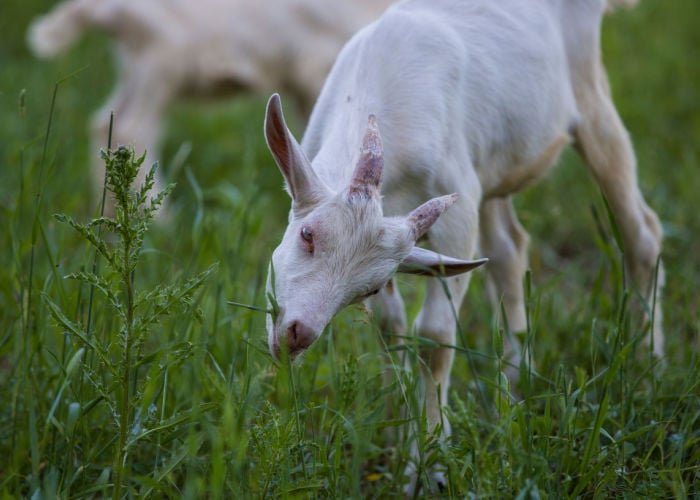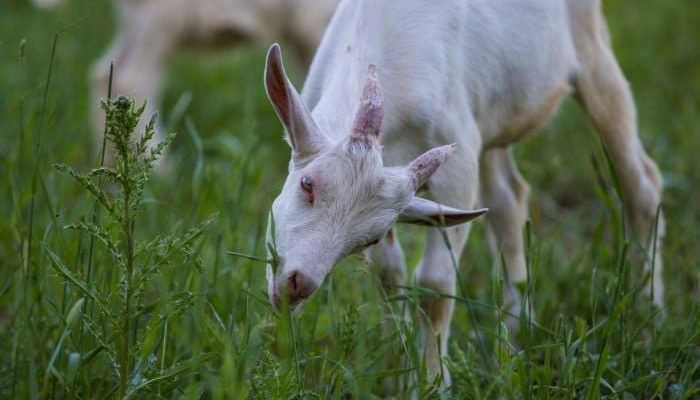
As a goat owner—or someone considering becoming one—you might be wondering what specific health issues Saanen goats face and how to prevent them. Understanding these common problems is key to ensuring your goats have long, happy lives. Let’s dive into some of these health concerns and explore effective prevention tips that can help you keep your furry friends in tip-top shape.
Digestive Problems: A Common Concern
Saanen goats can be prone to various digestive issues. One of the most common problems is bloat, a condition that occurs when gas builds up in the stomach, making the goat uncomfortable or even seriously ill. It’s often triggered by a sudden change in diet, like introducing rich pasture after they’ve been on dry feed. Think of it like you suddenly eating a whole pizza after only snacking on crackers.
To prevent bloat, gradually introduce new foods into their diet. This could mean mixing in new hay or allowing them to graze on fresh grass slowly over several days. Also, keep an eye on their overall diet. A balanced mix of hay, grains, and minerals goes a long way in maintaining healthy digestion.
Another issue is enterotoxemia, often known as “overeating disease.” It happens when goats consume too many carbohydrates in a short amount of time, leading to a toxic buildup in their system. The best prevention for this is monitoring their grain intake and providing a consistent feeding schedule. You might even consider using a rationed feeding system to control portions, just like you might limit dessert to avoid a stomachache!
Respiratory Problems: Knowing the Signs
Respiratory problems can sneak up on your Saanen goats, especially in humid or overcrowded environments. Signs of respiratory issues include coughing, nasal discharge, or labored breathing. These symptoms are like your body telling you, “Hey, something’s not right!”
To keep your goats breathing easy, always provide them with adequate ventilation in their shelter. Proper airflow helps reduce moisture and prevent respiratory infections. Regularly clean their living area to minimize dust and allergens, similar to how we clean our homes to reduce the risk of allergies. If you notice any signs of illness, don’t hesitate to consult a vet—early detection is crucial.
Preventative care can also include vaccinations against common respiratory diseases, like pneumonia. Keeping their vaccination schedule up to date helps protect them from these unwanted illnesses. Think of it as giving them the armor they need to fight off invaders.
Foot and Hoof Health: Walking Tall
Saanen goats are graceful creatures, but their feet can be a bit delicate. Foot rot is a common issue that can cause pain and lameness. It usually occurs in wet, muddy conditions, when bacteria get into the cracks of their hooves. Imagine walking in a pair of shoes that’s slowly falling apart—uncomfortable, right?
To prevent foot rot, make sure to trim their hooves regularly, about every six to eight weeks. This keeps their feet healthy and helps prevent any buildup of debris that might lead to infections. Keeping their living area dry and clean is equally important. If you notice any signs of lameness, act quickly to address it.
Another aspect to consider is proper nutrition. Goats need essential nutrients, like minerals and vitamins, to maintain healthy hooves. Consider adding biotin supplements to their diet, which can promote hoof strength and health. Just like we take vitamins for strong nails and hair, goats benefit from a little extra support too!
Skin Issues: Keeping Your Goats Comfortable
Saanen goats are known for their beautiful coats, but they can still face skin problems. Fleece matting and skin infections are common, especially if they’re kept in unsanitary conditions. Imagine having a cozy sweater that you never wash—it would get pretty gross, right?
To keep their skin healthy, regular grooming is a must. Brush your goats often to remove dirt, loose hair, and debris. Not only does this keep their coats clean, but it also strengthens the bond between you and your goats. You might also consider checking for parasites like lice or mites, which can cause significant discomfort and skin issues.
Another essential tip is to provide adequate shelter that protects them from harsh weather conditions. This can include shade during the summer and proper bedding during the winter to help keep their skin dry and healthy.
Reproductive Health: A Delicate Matter
If you’re planning on breeding your Saanen goats, understanding reproductive health is critical. Female goats, or does, can experience problems like metritis, an infection that can occur after giving birth. It’s like having a complicated recovery after surgery; you need to monitor them closely to ensure they’re healing properly.
To prevent metritis, maintain a clean birthing environment and monitor does during and after delivery. Providing proper nutrition during pregnancy and lactation is also vital for the overall health of both the mother and her kids.
Regular veterinary check-ups can help catch any reproductive issues early. If you notice any signs of illness—like a change in appetite or abnormal discharge—don’t hesitate to reach out for help. Keeping this aspect of their health in check ensures a comfortable and smooth breeding experience.
Taking care of Saanen goats is a rewarding experience, but it comes with its challenges. From preventing digestive issues to ensuring their skin and feet are healthy, there’s a lot to consider. By being proactive and attentive, you can create a healthy environment for your goats.
Remember, just like any other member of your family, they rely on you for their well-being. With proper care, regular check-ups, and a good understanding of common health issues, you can help your Saanen goats live long, happy lives. So grab a cup of coffee, spend time with your goats, and enjoy the joy they bring to your life!

